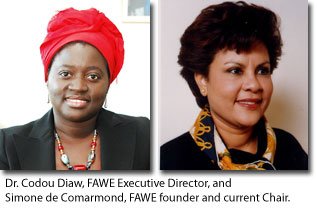 On behalf of The Forum For African Women Educationalists (FAWE), recipient of the 2008 Henry R. Kravis Prize in Leadership, FAWE Executive Director Dr. Codou Diaw, and founder and current Chair Simone de Comarmond, will visit the Marian Miner Cook Athenaeum on Monday, April 14 for a lunchtime discussion about the organization's work on behalf of African girls. The public portion of the lecture begins at noon, with free seating on a first-come basis.
On behalf of The Forum For African Women Educationalists (FAWE), recipient of the 2008 Henry R. Kravis Prize in Leadership, FAWE Executive Director Dr. Codou Diaw, and founder and current Chair Simone de Comarmond, will visit the Marian Miner Cook Athenaeum on Monday, April 14 for a lunchtime discussion about the organization's work on behalf of African girls. The public portion of the lecture begins at noon, with free seating on a first-come basis.
The third annual Kravis Prize In Leadership was awarded to FAWE during evening ceremonies in New York on April 10 at The Metropolitan Museum of Art, with Diaw and de Comarmond accepting on behalf of the organization. Other FAWE founders attending Thursday's presentation included Alice Tiendrebeogo, Former Minister of Education, Burkina Faso; Paulette Moussavou Missambo, Former Minister of Education, Gabon; and FAWE executive director Dr. Eddah Gachukia (19992-1998).
FAWE increases educational access, retention and performance for girls in 33 African nations.
The Kravis Prize, which carries a $250,000 award designated to the honoree organization, recognizes extraordinary leadership in the non-profit sector. FAWE was selected for its outstanding record providing an estimated 12 million girls and women with access to education thereby contributing to improving their standard of economic and social well-being.
Established in 2006, The Henry R. Kravis Prize in Leadership recognizes and celebrates extraordinary accomplishment and bold, visionary leadership in the nonprofit sector. The Kravis Prize is administered by Claremont McKenna College, the Kravis Leadership Institute, and Marie-Jos?e and Henry R. Kravis. Mrs. Kravis, an economist, is a Senior Fellow of the Hudson Institute; Mr. Kravis, founding partner of Kohlberg Kravis Roberts & Co., is an alumnus and trustee of Claremont McKenna College.
"It is important to recognize that the entrepreneurial spirit and leadership characteristics are just as vital to achievement in the not-for-profit world as they are on Wall Street," said Henry Kravis. "We are pleased and proud to recognize and celebrate the important and inspirational work being done by the leaders, staff, and volunteers of FAWE."
The Forum for African Women Educationalists (FAWE)
In 1992, female Ministers of Education from five African countries established FAWE to advocate for the education of girls across Africa. At that time, an estimated 24 million school-age girls were out of school in Sub-Saharan Africa. FAWE's founders recognized the direct personal benefits that accrue to girls who attend school, as well as the extensive indirect benefits for society at large.
In the ensuing 15 years, FAWE expanded its programs and developed a strong geographic presence across the continent, working in 33 African countries. Today, FAWE is the leading non-governmental organization in Africa that directly addresses issues relating to girls' education.
FAWE improves access to education as well as quality of education, inspiring girls to stay in school and learn. FAWE's current programs are organized around four interventions: 1) addressing constraints to access, retention and performance in the educational process, 2) undertaking advocacy to raise awareness and influence policymaking, 3) developing gender-responsive models for training teachers and improving learning environments, and 4) facilitating the replication and mainstreaming of best practices. In response to FAWE's advocacy, for example, many African governments adopt gender positive policies such as free primary education, re-entry policies for adolescent mothers, scholarships for needy girls, and appointment of more female teachers.
Extensive collaboration, teamwork and partnerships are integral to FAWE's success. Internally, FAWE engenders a spirit of teamwork and collective leadership among diverse individuals. Externally, FAWE provides a model for working directly with governments and policymakers to obtain large-scale impact. FAWE is also a model of pan-African collaboration. FAWE's wide geographic presence provides a unique forum to leverage economies of scale and share knowledge, especially among African governments and Ministries of Education. FAWE recently established a presence in many areas experiencing or transitioning from conflict, including Somalia, the Democratic Republic of Congo, South Sudan, Angola and Congo (Brazzaville).
